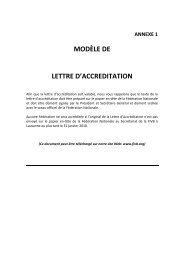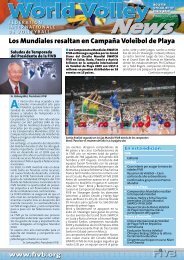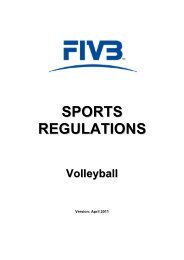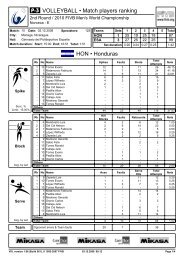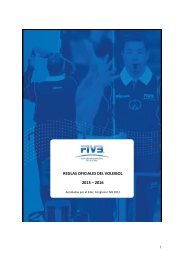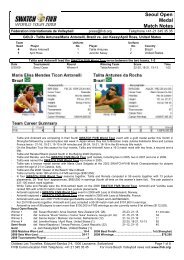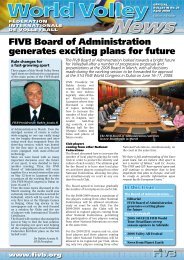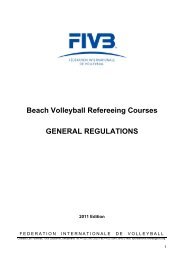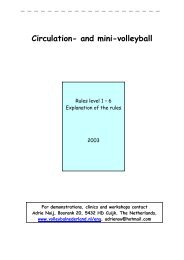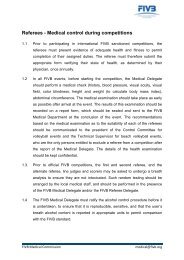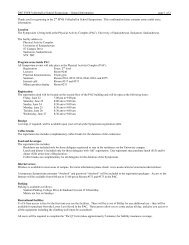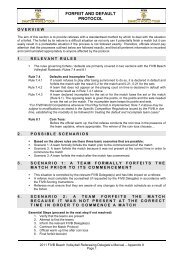MEDICAL REGULATIONS 11 Edition - FIVB
MEDICAL REGULATIONS 11 Edition - FIVB
MEDICAL REGULATIONS 11 Edition - FIVB
Create successful ePaper yourself
Turn your PDF publications into a flip-book with our unique Google optimized e-Paper software.
<strong>FIVB</strong> Medical Regulations – <strong>11</strong>th <strong>Edition</strong><br />
D. <strong>MEDICAL</strong> SERVICES TO BE PROVIDED<br />
DURING <strong>FIVB</strong> SANCTIONED COMPETITIONS<br />
The <strong>FIVB</strong> Board of Administration in its meeting of 17-19 March 2012 decided to adopt the<br />
Medical Code of the Olympic Movement for the purposes of all <strong>FIVB</strong>, World and official<br />
competitions.<br />
Prior to the actual competition, the proposed venue(s) and associated facilities should be<br />
inspected to ensure the services outlined in the following checklist are available (see<br />
Operational Manual Check List Template, H Medical Room, Anti-Doping Facilities).<br />
Checklist:<br />
1. Confirm the availability of a WADA accredited doping laboratory, and the<br />
availability of trained personnel and the necessary doping control equipment.<br />
2. Confirm the availability of suitable rooms for the collection of urine samples in<br />
accordance with <strong>FIVB</strong> Doping Control Regulations.<br />
3. Confirm the availability of breath alcohol analysis equipment.<br />
4. Confirm the availability of appropriate space to permit referee medical controls.<br />
This medical room must be equipped with a calibrated weight scale, height rod,<br />
Snellen chart and blood pressure monitor. The referee examinations to be<br />
conducted by a physician from the organizers who is licensed to practise<br />
medicine in the organizing country.<br />
5. Assess the adequacy of rooms designated for the Player’s Medical Area and for<br />
Spectator First Aid, confirm the availability of medical equipment and personnel to<br />
staff the medical areas at the competition and training venues.<br />
6. Discuss with the organiser the daily menu for the players, to insure that the meal<br />
planning is in accordance with <strong>FIVB</strong> Medical Regulations.<br />
7. Designate hospitals for possible emergency medical service for both athletes and<br />
spectators, and determine if there is an adequate mechanism for securing timely<br />
medical assistance in the hotels where the participants will be accommodated.<br />
8. Assess the adequacy of necessary medical services, and verify the identity of:<br />
• The local Medical Director<br />
• Anti-doping control teams:<br />
- medical doctor - responsible for anti-doping control<br />
- 1-2 technicians<br />
- 2-4 persons for the escort of selected players<br />
• one medical doctor, and (if indicated) one additional health care provider<br />
for the First Aid area<br />
• one health care provider assigned to cover the training venue<br />
• the availability of urgent care on an as-needed basis at the players'<br />
hotel, in addition to on-site emergency medical services at the playing<br />
venue(s)<br />
9. Following the pre-competition inspection a complete written report should be<br />
prepared, which should in turn be forwarded to the Medical Delegate assigned to<br />
the competition in question.<br />
10. Upon arrival at the competition, the Medical Delegate should confirm that all<br />
items in the above checklist are indeed adequately addressed and provided for.<br />
- 40 -



